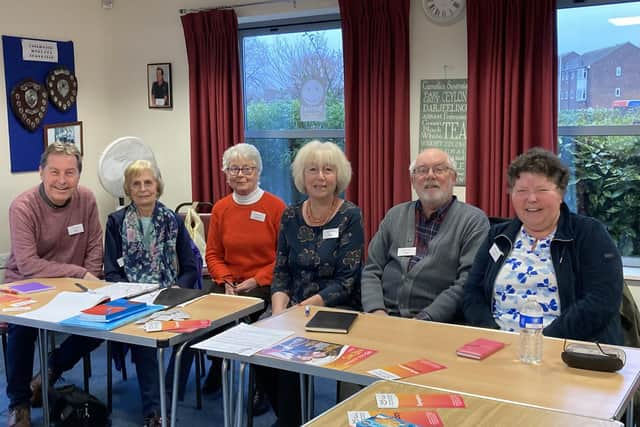Polymyalgia Rheumatica and Giant Cell Arteritis: Charity wants to set up more support groups
This article contains affiliate links. We may earn a small commission on items purchased through this article, but that does not affect our editorial judgement.
and live on Freeview channel 276
PMRGCAuk is a national patients information and support charity for those with the conditions.
The charity Polymyalgia Rheumatica and Giant Cell Arteritis UK, or PMRGCAuk, is a patient group and remains governed today by trustees, the majority of whom live with one of the conditions, as well as being shaped by a membership of patients with either PMR or GCA.
Advertisement
Hide AdAdvertisement
Hide AdIt supports people via local support groups, a helpline and an online support forum for any patient with these conditions.


Phil Cotterell is the Sussex regional organiser, he said: “PMRGCAuk is the only charity in existence dedicated to promoting knowledge and awareness amongst the public, with those diagnosed and their families, as well as raising the profile of the conditions with the medical profession.”
Polymyalgia rheumatica (PMR) is a condition that causes pain, stiffness and inflammation in the muscles around the shoulders, neck and hips.
Phil said: “It often makes walking and doing everyday tasks very difficult. Typically getting out of bed in the morning and standing and walking is very difficult.”
Advertisement
Hide AdAdvertisement
Hide AdIt is an age-related condition. Most people diagnosed with it are over 70, and it's very rare in people younger than 50. It's also more common in women than men.
It's estimated 1 in every 1,200 people in the UK develop the condition every year.
A corticosteroid medicine called prednisolone is the main treatment for polymyalgia rheumatica. It's used to help relieve the symptoms.
Phil, 62, lives in Worthing, he was diagnosed with PMR in 2017, he had the classic symptoms of stiff and painful neck and shoulders as well as difficulty getting out of bed and moving in the mornings.
Advertisement
Hide AdAdvertisement
Hide AdOver a number of years Phil was prescribed steroids, which seemed to help but had on multiple occasions been told he didn’t have PMR and his medication was modified.
He said: “Then in July 2020 I noticed a marked deterioration in my walking. I was feeling quite exhausted with exercise despite being fit and active, including a lot of hill walking. The change was stark. I saw another rheumatologist who again told me I didn’t have PMR and to get off steroids. He did though refer me for an FDG PET-CT scan at the University of Sussex.”
From this a diagnosis of Large Vessel Vasculitis (LVV) was made in September 2020. Phil had inflammation in my aorta, carotid and subclavian arteries. He then started high dose steroids but felt no better and was started on methotrexate as well in the October.
He said: “I found I could not reduce the steriods below 20mg without being very fatigued and started tocilizumab injections in February 2021. This is a monoclonal antibody used to treat inflammation.”
Advertisement
Hide AdAdvertisement
Hide AdGiant Cell Arteritis (GCA) is the more serious condition of the two, otherwise known as temporal arteritis it is where the arteries, particularly those at the side of the head (the temples), become inflamed.
Phil said: “Blindness can occur in about 20 per cent of people. GCA is a disease known as ‘giant cell’ because of the presence of very large inflammatory cells in the wall of the arteries, causing them to swell and sometimes become blocked.
"The condition affects large arteries of the head, neck, upper limbs and the main artery of the body – the aorta. If GCA affects the arteries of the head it is known as temporal arteritis because the temporal arteries to the side of the forehead can be visibly swollen.”
GCA exclusively affects people over the age of 50 and primarily in those between the ages of 60 and 80 years.
Advertisement
Hide AdAdvertisement
Hide AdPhil said: “It is a rare condition thought to affect about 19 people per 100,000 over the age of 50 years. In a town the size of Worthing for example there will be about 10 people with GCA.”
It typically affects women more than men and those of northern European descent. GCA is an auto-immune disease (disease of the immune system).
The charity has support groups for people but that pandemic meant these had to be stopped, but Phil is helping to restart the Sussex groups.
The groups in Chichester and Eastbourne have recently been reformed, and there are plans to start a new group in Haywards Heath, with the Brighton and Worthing groups meeting face to face. Phil says that they are keen to start new groups in areas of need and wants people to get in touch.
Advertisement
Hide AdAdvertisement
Hide AdHe adds: “Local support groups are informal and members have a space to talk about PMR/GCA, how it is affecting them and to gather ideas from each other. They are also a place to get information about these conditions. Members value the opportunity to hear about other people’s experiences and it cannot be underestimated how positive it is to know that you are not alone in living with these challenging conditions.”
Phil added: “It is a small charity and people can help by volunteering, by donating and by joining the charity.”
To find out more about PMR or GCA then contact the helpline on 03001115090 or see their website, www.pmrgca.org.uk To find out more about a support group near you then please see the website or email [email protected]
Visit Facebook: www.facebook.com/pmrgcauk